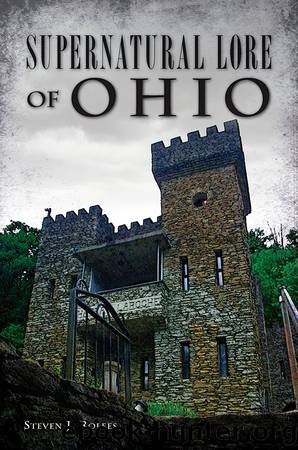Supernatural Lore of Ohio by Steven J. Rolfes

Author:Steven J. Rolfes
Language: eng
Format: epub
Publisher: Arcadia Publishing Inc.
Published: 2020-09-15T00:00:00+00:00
6
GHOSTS OF THINGS THAT SHOULD NOT BE GHOSTS
A most ghastly place; its leprous walls and deadly moisture; its stones seem to sweat an icy and deathlike dampness; the vaulted roof and sides are covered with growths of white fungi, hideous and poisonous, ghastly exhalations seem to rise from its floor.
âCincinnati Commercial, August 29, 1875
Turning now from witches to ghosts, we must first note that the Buckeye State has a long list of hauntingsâfar too many to catalogue here. The Ohio Penitentiary is a veritable cauldron of supernatural activity, as are many other prisons, hospitals and insane asylums. Like other states, Ohio has no shortage of women in white, such as the one in the Old Baptist Cemetery in Jackson, the younger girl in the Old Logan Cemetery in Logan, the one often seen crossing the Lucy Run Cemetery Road in Batavia or the lady haunting the Ye Olde Tavern in Yellow Springs (this one wears blue). Ohio has plenty of ghost children, such as the one in the Veterans Memorial Hospital in Pomeroy, the Amber Rose Restaurant in Dayton, the building housing the Fulton County Historical Society in Wauseon or the one who cries on the Ghormley Road Bridge in Greenfield. Ohio certainly has more than its share of haunted theaters, such as the Twin City Opera House in McConnelsville, the old Valentine Theatre in Defiance and the Schines Strand Theatre in Delaware, to say nothing of the man in a yellow raincoat haunting the Agora Theatre in Cleveland. However, as there are so many, we will limit ourselves to the more unusual hauntings, especially those with really good stories behind them.
In this chapter, we will take a quick look at some ghosts that should not be ghosts, seeing as they were never aliveâor never humanâin the first place.
First among these is what may well be Ohioâs most famous phantom, even if it was just passing through. On April 29 of each year, hundreds of people line the railroad tracks in Urbana waiting for the arrival of the ghost of the funeral train of the fallen president Abraham Lincoln.
At the end of the Civil War, the sixteenth president had a terrible dream that he related to his wife and a few close friends. He dreamed that he was walking through the White House late at night when he came upon a coffin with a soldier standing honor guard. Asking who had passed, he was informed that the president had been assassinated.
Lincolnâs premonitions continued. On Good Friday, April 14, he stated that he did not want to attend the play Our American Cousin at Fordâs Theatre. In fact, he had already seen the play but felt that a sense of destiny compelled him to be there.
In the section of the play when a comic rustic character delivers a humorous soliloquy, actor and Confederate sympathizer John Wilkes Booth crept into the presidential box. He knew that everyoneâs attention would be on the funny character on the stage and that there would be the sound of laughter.
Download
This site does not store any files on its server. We only index and link to content provided by other sites. Please contact the content providers to delete copyright contents if any and email us, we'll remove relevant links or contents immediately.
The Compleat Magical Path Magic Lessons by John Cross(440)
The Return of the Dragon : The Shocking Way Drugs and Religion Shape People and Societies by Lewis Ungit(414)
THEM: They Come at Night by Tom Lyons(402)
The Bonds That Bind by K. J. Lavallee(400)
Dogme et Rituel de la Haute Magie Part I by Eliphas Levi(397)
Shaman: The Mysterious Life and Impeccable Death of Carlos Castaneda by Mike Sager(389)
The Mind at Large: Clairvoyance, Psychics, Police and Life after Death: A Polish Perspective by Weaver Zofia & Janoszka Krzysztof(386)
Strange Tricks by Syd Moore(384)
The Iron Republic by Richard Jameson Morgan(379)
Haunted Ships: True Paranormal Ghost Ship Stories by Press Chronicle(370)
Psychic Secrets by Jade-Sky(365)
101 Ways to Jump-Start Your Intuition by John Holland(364)
Kabbalah and Sex Magic by Marla Segol(359)
Cult Cinema: A Personal Exploration of Sects, Brainwashing and Bad Religion in Film and Television by Ingham Howard(357)
Evil Unleashed: True Tales of Spells Gone to Hell and Other Occult Disasters by John Harker(349)
Kickstart My Witch (Witch's Guide to Haunted Properties: Los Angeles: Mystery Book 1) by Lotta Smith(343)
The Blood Electric: Nephilim Unbound 5 by Jason Caldwell(341)
The Satanism Scare by Joel Best(334)
The Exorcist's House: Genesis by Nick Roberts & Crystal Lake Publishing(329)
